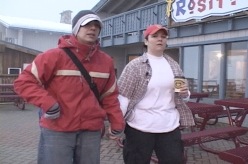-
- Bob Hattoy dies of heart attack at age 56
- Air Force captain sentenced to 50 years in prison for rape
- Romney criticizes McCain, Giuliani on immigration, gay rights
- Gay Episcopal bishop says American church should not sacrifice gays to keep ties to Anglicans
- Court: Law recognizes same-sex relationships similar to marriage
- City officials: Purported hate crime was faked
- National News Briefs
- World News Briefs
Arts & Entertainment
Out at the movies
Published Thursday, 08-Mar-2007 in issue 1002
Latino Film Festival once again showcases Cine Gay series
For the second year in a row, the Latino Film Festival has included a Cine Gay series to celebrate diversity in independent film. This year’s focus is on family life in the Latino community.
The bad news is that two of this year’s hand-pressed DVD screeners would neither play on my machines nor would they play on my friends’ machines. I was finally able to view Through Thick and Thin, but I’m afraid that La Buena Voz, which was touted as the best of the Cine Gay entries, went unscreened.
Why audiences get to watch films projected on a screen and critics don’t has always puzzled me. Isn’t it wise to give reviewers the best shot at seeing your films, so purists (like me) won’t give you bad press?
According to the press release, “Last year, several of the Cine Gay features films completely sold out, even after repeat screenings.” Note to festival programmers: If Cine Gay was such a smash, they can surely afford to act professionally and spend a few bucks on screenings next year.
This year’s festival runs from March 8-18 at the UltraStar Theatre at Hazard Center in Mission Valley and the Centro Cultural Tijuana.
Through Thick and Thin
Edited, photographed and directed by Sebastian Cordoba
83 min.
Screens: UltraStar Theatre March 13 at 6:30 p.m. and Centro Cultural Tijuana March 17 at 5 p.m.
All the talk of border tightening in recent headlines tends to center on the plight of Mexicans looking for asylum in the United States. Sebastian Cordoba’s film is the first to my knowledge that sheds light on gay immigration rights and bi-national relationships in which one partner is not an American citizen.
At its core, Through Thick and Thin, a shot-on-video documentary tailor made for the festival circuit, questions America’s false sense of freedom. We follow the lives of five very-much-in-love couples forced by law to constantly uproot their lives by changing jobs or, in some cases, homes and countries.
Since same-sex relationships are not sanctioned in the eyes of Uncle Sam, they do not qualify for immigration sponsorship purposes. Needless to say, there is no consideration given to the amount of time any of these couples have shared together.
The first couple we meet are Aileen (Seattle) and Suzie (Peru). Both feel that the government has given their romance six months to live. Cordoba sees to it that we spend quality time with all of the participants. It means so much more when we view them as human beings as opposed to documentary illustrations. Sue knows that retuning home could very well place her in mortal danger, an argument her lawyer adopts at an INS hearing.
In Emilio’s (Venezuela) eyes, being awarded an additional six month stay means only one thing: more time to worry. After overstaying his visa, Emilio became an illegal. He and Tom (New Jersey) have been together for four years, own a home and long to adopt. Due to a bill passed in the House, they are considering a move to Canada.
Halfway through their 15-year relationship, Fred (France) obtained a work visa and adopted two boys. Mark (Pennsylvania) would be more than happy to move to France, but their children’s adoption is not recognized there. Fred can legally live in the United States if he stays in college, but the high cost of tuition is rapidly depleting the couple’s funds.
Tammy (Pennsylvania) and Sally (U.K.) were both unhappily married when they met on line. Instead of fighting bureaucracy, Tammy worked hard to obtain a visa that would allow her to accept employment in England. Sally’s sons will have difficulty dealing with two “mums,” but it’s Tammy’s choice to put her kids “an ocean away” that provides one of the film’s many emotional moments.
Terry (Manchester, U.K.) and Charlie (Idaho) are near identical lovers. For most of his time on screen, we see Charlie via computer phone. Given the seven-hour time difference, the two men grab whatever moments they can to talk on line.
Terry can’t relocate, so the two are only able to spend about six weeks out of the year together. When Terry pays a visit to Idaho, Charlie sums the situation up by saying, “It’s so nice to be shoveling shit together.”
Anthony (New Jersey) and Andre (Brazil) are the film’s May/December lovers. They met online, where Andre advertised himself as a “Brazilian bear.” The first time Andre came to visit, the Immigration & Nationalization Service denied him entry due to a technicality, and he was never again issued a visa.
Over a four-year period, Anthony, rapidly succumbing to kidney failure, made many visits to Porto Alegre. The first time we meet him is the night before one such trip. He wanted to move to Brazil but couldn’t for fear of losing out on his Medicare benefits.
The least interesting of the bunch are Ravneet (Los Angeles) and Kiran (U.K.). Both met as teenagers before they knew they were gay. It doesn’t help that Cordoba shows Ravneet shopping for stuffed animals and backs up their airport rendezvous with a Hallmark greeting card treatment complete with a cover version of Sting’s “Fields of Gold.”
Not every story has a happy ending. Every minute these couples share is precious because any day could be their last one together. Just when you think all of the bases have been covered, a film like Through Thick and Thin arrives adding a fresh new face to oppression.
Rating:
East Side Story
Directed by Carlos Portugal
Written by Carlos Portugal and Charo Toledo
Starring: Rene Alvarado, Irene DeBari, David Beron and Gladys Jiminez
88 min.
Screens: UltraStar Theatre March 9 at 10 p.m. and March 17 at 8:30 p.m.
Talk about “I Feel Shitty,” this limp tale of “being gay in East L.A.” is an hour-and-a-half Telenovella that seems to last 13 weeks.
Diego (Rene Alvarado) is a grandma’s boy, pushing 30 and drowning in family traditions. Not only is he dying to come out of the closet, he also can’t wait to break free from granny’s (Irene DeBari) noose-like apron strings.
From what we are shown of Diego and his soon-to-be ex-boyfriend, their relationship is founded solely on fantasy. The film opens with Diego role playing as a passive illegal to Pablo’s (David Beron) dominant border agent. For real estate agent Pablo, homosexuality is just a phase, and it isn’t long before he’s dating Diego’s aunt Blanca (Gladys Jiminez).
All of this is set against the changing backdrop of a Latino neighborhood. The Mexicans are gradually being displaced by white gay men. This causes the chef in Diego’s family restaurant to write a gay-bashing editorial for a local paper. Don’t worry, as soon as Diego fires him the bigot drops dead on the spot.
Any other overly familiar ground being trampled? Let’s see… there’s the waitress who belongs to a church that can cure Diego of his sickness. What about the guy who, as soon as he learns that Diego’s parents are dead, assumes it was gang related? Of course not! They were killed by a couple of drunk gringos behind the wheel.
Diego eventually comes out and falls for a nice Anglo across the street. It just goes on and on. If anything, I’m making this caravan of stick figures spouting clichés sound better than it is. To call this a soap opera is a supreme insult to the lowest form of television.
Unless your car breaks down outside the theater and it will take two hours to get a repair truck, don’t go near this insulting time-waster.
Rating: m
|
|
Copyright © 2003-2025 Uptown Publications





